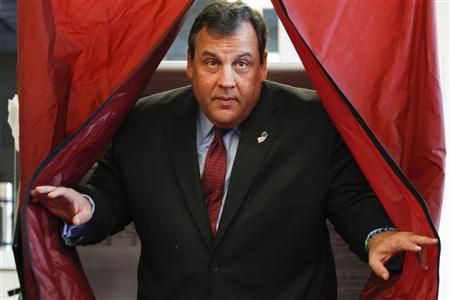Bridgeghazi Backlash: Conservatives Livid Over Hashtag For Chris Christie GWB Scandal

For evidence of our eternally polarized political climate, sometimes you need to look no further than a hashtag.
In the wake of the Chris Christie George Washington Bridge scandal on Wednesday, numerous phrases and hashtags clawed their way up the trending sidebars of Twitter and Facebook. The most notable was #Bridgegate, an obvious designation rehashing the sorely overused Watergate suffix. Serviceable? Sure. Creative? Not especially. After all, the late, great grammarian (and ex-Nixon aide) William Safire started “gating” scandals almost four decades ago.
But at around the same time that Bridgegate surfaced, a cleverer -- and apparently more divisive -- term emerged: “Bridgeghazi.” An amalgam of “Bridge” and “Benghazi,” the term an admittedly fresher way to instantly scandalize a situation. But the intense reactions to it also underscore the narrow lens through which we insist on viewing major news events, stubbornly unwilling to separate scandals from our own political leanings.
The Bridgeghazi hashtag has been going strong on Twitter for more than 24 hours, but for different reasons. To many left-leaning Twitter users, the term is hilarious -- a gleeful way to tweet information about the GWB scandal while also offering a bit of subtextual commentary on the Tea Party’s unwillingness to let go of the Sept. 11, 2012, attacks in Benghazi, Libya. Consider the following tweet from the sex-advice columnist and noted gay activist Dan Savage.
Word of the day: #Bridgeghazi. Hilarious. (Changing my Sunday flight to JFK.)
- Dan Savage (@fakedansavage) January 9, 2014But many conservative tweeters aren’t seeing the humor. As instances of “Bridgeghazi” spread on Twitter Wednesday, numerous right-leaning users called out the “insensitively vile” journalists and news outlets that used the “repugnant” term. To them, the hashtag is disrespectful to the four Americans who were killed in the attack on the U.S. diplomatic mission in Benghazi. Do they have a point? Maybe, but only insofar as any tragic event can be considered off limits to cultural commentary. Everything, in the end, is close to home for someone.
As is often the case on Twitter, the outrage over #Bridgeghazi is not directed at the alleged crime itself. (Two lanes of traffic were purposely shut down on the world’s busiest bridge for no other reason but political retribution.). Rather, scorn is being directed at the “others,” the classless lowlifes who dare to make light of something sacred. Indeed, if the conservative website Twitchy is to be believed, the BridgeGhazi hashtag is simply the worst thing that’s ever happened in the history of mankind. “This has to be the most vicious, disgusting reaction yet,” the website wrote when BuzzFeed’s Andrew Kaczynski tweeted a Bridgeghazi black-ribbon meme.
#Bridgeghazi pic.twitter.com/l4FnnnU5PT
- Andrew Kaczynski (@BuzzFeedAndrew) January 8, 2014Following the post, Kaczynski was attacked on Twitter for several hours, mostly from conservatives who found the Bridgeghazi hashtag in poor taste.
When @BuzzFeedAndrew skips a flight, it's a national emergency. When four Americans are murdered, it's a punchline. https://t.co/nIZMIBU24T
- Sean Davis (@seanmdav) January 9, 2014Dead Americans are not memes #Benghazi MT @BuzzFeedAndrew Noticed my conservative trolling hasn't been as good as my liberal trolling lately
- Will Antonin (@Will_Antonin) January 9, 2014@buzzfeedandrew @BuzzFeedNews at least Rodman had an excuse. What's your excuse for making fun of 4 dead Americans murdered in Benghazi?
- Luckyjoe (@suthernboy100) January 9, 2014Later on Wednesday, Politico’s Jose Delreal used the hashtag in a headline, a move that attracted even more conservative ire. Twitchy got the ball rolling once again, calling Politico “sleazy” for its editorial choice.
are u f*in' kidding me??? Politico calls the Christie bridge thang..."BridgeGHAZI"?! WHAT a bunch of disgusting asskissin' hacks. #tcot
- The Real ExTex (@theRealExTex) January 9, 2014How on Earth is that hashtag ok? - RT @politico: Chris Christie's critics leap on #Bridgeghazi, via @jdelreal: http://t.co/RMPtVewY1q
- Cameron Gray (@Cameron_Gray) January 9, 2014@politico @jdelreal WHAT IS WRONG WITH U? Bridgeghazi hashtag is hurtful, insensitive to families of those killed in #benghazi! Grow up.
- AGal (@GallSueJoe) January 9, 2014Politico’s usage even got a response from Twitchy’s founder, the conservative pundit Michelle Malkin:
Wow. MT @gopfashionista: Politico hashtag is beyond poor taste ==> https://t.co/zeY6Gn617K
- Michelle Malkin (@michellemalkin) January 9, 2014Of course, all the outrage over #Bridgeghazi has only fueled the frequency of its use. (For more on that, look up “the Streisand effect.”) The hashtag was still going strong as of Thursday afternoon, and by now the vast majority of the tweets are offering no commentary on its appropriateness. It is, quite simply, an effective way to describe -- and share details about -- an emerging scandal.
Anything that gets us off our addiction to “gate.”
Got a news tip? Email me. Follow me on Twitter @christopherzara.
© Copyright IBTimes 2025. All rights reserved.






















